Jan 23, 2019
How can we find more balance with nature toward healing the Earth? In conversation with host Tenzin Wangyal Rinpoche, members of indigenous communities Lorenzo Ccapa and Zenobia Cruz from Peru, Mindahi Crescencio Bastida Muñoz from Mexico, and Colin Campbell from Africa discuss ancient perspectives on this critical topic of our time, share their own unique perspectives, and offer prayers for healing the Earth.
View recording on Facebook (68 minutes)
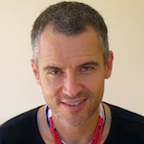 Colin Campbell grew up in rural southeastern Botswana, the son of a renowned anthropologist father and creative-healing mother. His grandmother was a famous healer, whom people traveled great distances to see. On formative childhood travels with his father he slept under the stars, learned from traditional San people the ways of the desert, awoke beside lion paw prints, and regularly fished cobras from his bedroom drawer. At age 11 he was diagnosed with the illness of calling, which ultimately led to his being trained and initiated as a traditional doctor and sangoma. From the time of his upbringing he acquired a deep knowledge of Tswana culture and its traditional medicinal and spiritual practices.
Colin Campbell grew up in rural southeastern Botswana, the son of a renowned anthropologist father and creative-healing mother. His grandmother was a famous healer, whom people traveled great distances to see. On formative childhood travels with his father he slept under the stars, learned from traditional San people the ways of the desert, awoke beside lion paw prints, and regularly fished cobras from his bedroom drawer. At age 11 he was diagnosed with the illness of calling, which ultimately led to his being trained and initiated as a traditional doctor and sangoma. From the time of his upbringing he acquired a deep knowledge of Tswana culture and its traditional medicinal and spiritual practices.
Colin is trained as a traditional African doctor and his medical practice is currently based in Cape Town, South Africa, and the U.K. He also has a degree in psychology and fine arts from the University of Cape Town. However, over the years his expanding experience has led him to embrace a number of other roles, from cultural spokesman-provocateur to transformational facilitator. Colin frequently runs organizational courses on cultural cosmology, ecological integration, holistic health and personal development.
Colin receives clients from all over the world and facilitates international group processes relating to natural law, transformation, healing and personal power, sacred sites, and cross-cultural cosmology. His work bridges major world cities, ancestral homelands, and forgotten wilderness, taking him from the Amazon basin to Los Angeles, the sacred sites of Venda to the urban grit of Johannesburg, and remote Ethiopia to the city of London. With his brother Niall Campbell, Colin co-founded and co-runs a training school in Botswana for traditional doctors and sangomas. He is also a lifelong artist and musician, his style bridging the traditional with the contemporary, the timeless with the timely, and the sounds of the sacred with the lyricism of electric rocking funk.
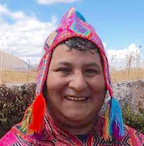 Lorenzo Ccapa Apaza is a Q’ero indian from the high Andes in Peru. His people, the Q’ero Nation, are descendants of the Quechuas and Inkas. They are the keepers of the sacred knowledge and are known as “masters of the living energy.” Lorenzo is the son of Martin Quispe Machacca, the only remaining Alto Misayoq (the highest spiritual leader recognized by the sky through receiving a thunderbolt in his body) of the Q’ero Nation, who is also a well-respected healer and spiritual leader in the Andean tradition and formerly served as president of his community. Lorenzo is a Pampa Misayoq, a spiritual leader who can talk with the mountains, rivers, and Mother Earth. He has been invited to Germany and Italy to offer healing sessions and despacho ceremonies (Inka-style mandalas or offerings). A student of Mariano Apaza, Bernabel Apaza and Martin Quispe, for more than 30 years he has learned and shared practices in his role as a Pampa Misayoq.
Lorenzo Ccapa Apaza is a Q’ero indian from the high Andes in Peru. His people, the Q’ero Nation, are descendants of the Quechuas and Inkas. They are the keepers of the sacred knowledge and are known as “masters of the living energy.” Lorenzo is the son of Martin Quispe Machacca, the only remaining Alto Misayoq (the highest spiritual leader recognized by the sky through receiving a thunderbolt in his body) of the Q’ero Nation, who is also a well-respected healer and spiritual leader in the Andean tradition and formerly served as president of his community. Lorenzo is a Pampa Misayoq, a spiritual leader who can talk with the mountains, rivers, and Mother Earth. He has been invited to Germany and Italy to offer healing sessions and despacho ceremonies (Inka-style mandalas or offerings). A student of Mariano Apaza, Bernabel Apaza and Martin Quispe, for more than 30 years he has learned and shared practices in his role as a Pampa Misayoq.
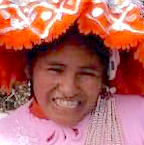 Lorenzo and his wife, Zenovia Cruz, work together to do offerings and rituals. In the approach they espouse toward healing the Earth, one begins by undergoing inner transformation and purification. One should perform the Ayni (service without expectations), always treat the Earth as a living being; ask permission of the mountains, rivers, lakes, and sky before entering them; and show one’s gratitude.
Lorenzo and his wife, Zenovia Cruz, work together to do offerings and rituals. In the approach they espouse toward healing the Earth, one begins by undergoing inner transformation and purification. One should perform the Ayni (service without expectations), always treat the Earth as a living being; ask permission of the mountains, rivers, lakes, and sky before entering them; and show one’s gratitude.
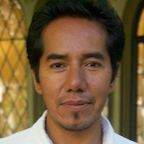 Mindahi Crescencio Bastida Muñoz is the director of the Original Caretakers Initiative at the Center for Earth Ethics. He serves as the general coordinator of the Otomi-Hñahñu Regional Council in Mexico, as a caretaker of the philosophy and traditions of the Otomi people, and (since 1988) as an Otomi ritual ceremony officer. Born in Tultepec, Mexico, he holds a doctorate of rural development from the Universidad Autónoma Metropolitana and is the president of the Mexico Council of Sustainable Development.
Mindahi Crescencio Bastida Muñoz is the director of the Original Caretakers Initiative at the Center for Earth Ethics. He serves as the general coordinator of the Otomi-Hñahñu Regional Council in Mexico, as a caretaker of the philosophy and traditions of the Otomi people, and (since 1988) as an Otomi ritual ceremony officer. Born in Tultepec, Mexico, he holds a doctorate of rural development from the Universidad Autónoma Metropolitana and is the president of the Mexico Council of Sustainable Development.
Bastida Muñoz is a member of the steering committee of the Indigenous Peoples’ Biocultural Climate Change Assessment Initiative, and has served as a delegate to several commissions and summits on indigenous rights and the environment. He has written extensively on the relationship between the State and indigenous peoples, intercultural education, collective intellectual property rights and associated traditional knowledge, among other topics. He has been working with indigenous peoples and communities around the world, mostly from the Americas, as well as from Australia, Japan, Africa, and the Arctic. His work is directed toward protecting Mother Earth through our role as its original caretakers, and also through the process of unifying indigenous peoples and other allies.
More about Mindahi Crescencio Bastida Muñoz
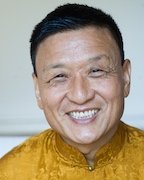 Geshe Tenzin Wangyal is an acclaimed author and a respected teacher of students worldwide. As the founder and spiritual director of Ligmincha International, he has established numerous centers and institutes of learning in the United States, Mexico, South America, Europe and India. Fluent in English, Rinpoche regularly offers online teachings in the form of live webcasts, online workshops and YouTube videos. He is renowned for his depth of wisdom; his clear, engaging teaching style; and his dedication to making the ancient Tibetan teachings highly accessible and relevant to the lives of Westerners.
Geshe Tenzin Wangyal is an acclaimed author and a respected teacher of students worldwide. As the founder and spiritual director of Ligmincha International, he has established numerous centers and institutes of learning in the United States, Mexico, South America, Europe and India. Fluent in English, Rinpoche regularly offers online teachings in the form of live webcasts, online workshops and YouTube videos. He is renowned for his depth of wisdom; his clear, engaging teaching style; and his dedication to making the ancient Tibetan teachings highly accessible and relevant to the lives of Westerners.

I am moved, enriched and sustained by the sharing here. Thank you for everything.